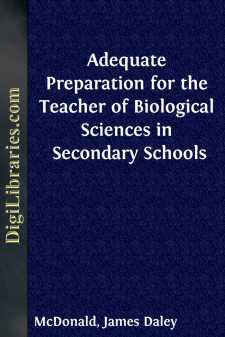Categories
- Antiques & Collectibles 13
- Architecture 36
- Art 48
- Bibles 22
- Biography & Autobiography 813
- Body, Mind & Spirit 142
- Business & Economics 28
- Children's Books 15
- Children's Fiction 12
- Computers 4
- Cooking 94
- Crafts & Hobbies 4
- Drama 346
- Education 46
- Family & Relationships 57
- Fiction 11828
- Games 19
- Gardening 17
- Health & Fitness 34
- History 1377
- House & Home 1
- Humor 147
- Juvenile Fiction 1873
- Juvenile Nonfiction 202
- Language Arts & Disciplines 88
- Law 16
- Literary Collections 686
- Literary Criticism 179
- Mathematics 13
- Medical 41
- Music 40
- Nature 179
- Non-Classifiable 1768
- Performing Arts 7
- Periodicals 1453
- Philosophy 64
- Photography 2
- Poetry 896
- Political Science 203
- Psychology 42
- Reference 154
- Religion 513
- Science 126
- Self-Help 84
- Social Science 81
- Sports & Recreation 34
- Study Aids 3
- Technology & Engineering 59
- Transportation 23
- Travel 463
- True Crime 29
Adequate Preparation for the Teacher of Biological Sciences in Secondary Schools
Description:
Excerpt
The use of the term preparation herein is intended to indicate partially the limitation of the problem attempted. The following discussion will be concerned only with such attributes of the successful teacher as are the direct result, or at least greatly enhanced by thorough preparation. A sufficiently comprehensive and difficult problem remains after still further restriction of the field so as to include only subject matter and the method of biological science.
It is scarcely necessary to make the statement that the standards of preparation and the facilities for meeting these standards have been enormously improved within the past few years. Evidence of this is found in the changes recently made in the curricula of and the requirements for graduation from the California State Teachers Colleges. Neither is it necessary to say that improvement must continue. Such problems are evolutionary. Notwithstanding that requirements for teachers certificates have been raised the country over, the universities are not generally making very rapid strides in affording opportunities for better preparation in subject-matter and special methods. In corroboration, witness the recent criticisms of the departmental courses in special methods now given in universities generally (Swift, 1918; Taylor, 1918). The length of time or the number of units of work required for certification may be increased but that does not insure a finer quality of preparation.
In attempting to explain the slow pace of improvement in the quality of preparation for the teaching of science, one becomes involved in a cycle. Science had its development in the college and university whence it diffused slowly into the secondary schools, and finally slightly into the elementary grades. The differences between the aims of college science and secondary school science were and still are not taken sufficiently into account. As an inevitable result there are to be found in the curricula of high schools too many science courses that are mere dilutions of the college type, with no modification of purpose, and just enough change in method and subject matter to bring them partially within the power of understanding of the less mature mind. This situation in turn reflected upon the higher institutions of learning in such a way that it seemed that they were giving adequate training of the correct type. And such would have been the case had the college course in the particular science been planned for the express purpose of being diluted to suit secondary school needs. But it will be generally conceded that such courses never have existed.
Another retarding factor in the evolution of the problem has been the subordination of special training in subject matter to other really less important qualifications, in the selection of teachers. The table given below, compiled from statistics gathered in one of the States during 1916, shows sufficient justification for the above statement. And not only has the preparation in subject matter been too little considered in choosing teachers, but also in the administration of schools specially intended for teacher-training. An educator of high standing in California is credited with making the criticism of the Normal Schools of the State; that they attempt to teach a person how to teach intelligently something about which he knows nothing. When teachers have adequate preparation in subject matter as well as in methods, and when they are employed to teach only those subjects for which they are fitted, then the problem of maintaining a high standard of teaching will be well nigh solved.
...

